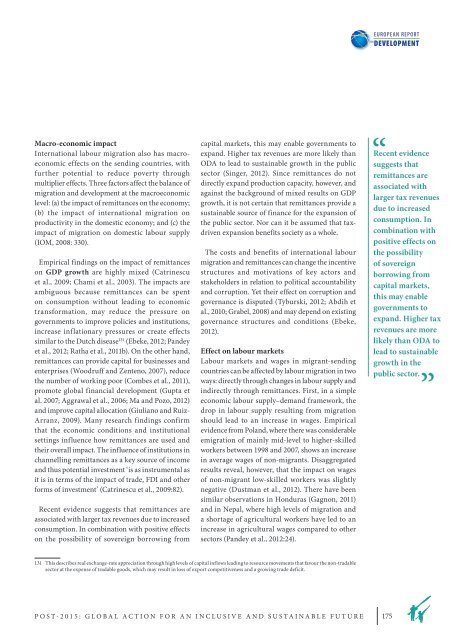Post 2015: Global Action for an Inclusive and Sustainable Future
Post 2015: Global Action for an Inclusive and Sustainable Future
Post 2015: Global Action for an Inclusive and Sustainable Future
Create successful ePaper yourself
Turn your PDF publications into a flip-book with our unique Google optimized e-Paper software.
Macro-economic impact<br />
International labour migration also has macroeconomic<br />
effects on the sending countries, with<br />
further potential to reduce poverty through<br />
multiplier effects. three factors affect the bal<strong>an</strong>ce of<br />
migration <strong>an</strong>d development at the macroeconomic<br />
level: (a) the impact of remitt<strong>an</strong>ces on the economy;<br />
(b) the impact of international migration on<br />
productivity in the domestic economy; <strong>an</strong>d (c) the<br />
impact of migration on domestic labour supply<br />
(Iom, 2008: 330).<br />
Empirical findings on the impact of remitt<strong>an</strong>ces<br />
on GDP growth are highly mixed (catrinescu<br />
et al., 2009; chami et al., 2003). the impacts are<br />
ambiguous because remitt<strong>an</strong>ces c<strong>an</strong> be spent<br />
on consumption without leading to economic<br />
tr<strong>an</strong>s<strong>for</strong>mation, may reduce the pressure on<br />
governments to improve policies <strong>an</strong>d institutions,<br />
increase inflationary pressures or create effects<br />
similar to the Dutch disease 131 (Ebeke, 2012; p<strong>an</strong>dey<br />
et al., 2012; ratha et al., 2011b). on the other h<strong>an</strong>d,<br />
remitt<strong>an</strong>ces c<strong>an</strong> provide capital <strong>for</strong> businesses <strong>an</strong>d<br />
enterprises (Woodruff <strong>an</strong>d Zenteno, 2007), reduce<br />
the number of working poor (combes et al., 2011),<br />
promote global fin<strong>an</strong>cial development (Gupta et<br />
al. 2007; aggrawal et al., 2006; ma <strong>an</strong>d pozo, 2012)<br />
<strong>an</strong>d improve capital allocation (Giuli<strong>an</strong>o <strong>an</strong>d ruizarr<strong>an</strong>z,<br />
2009). m<strong>an</strong>y research findings confirm<br />
that the economic conditions <strong>an</strong>d institutional<br />
settings influence how remitt<strong>an</strong>ces are used <strong>an</strong>d<br />
their overall impact. the influence of institutions in<br />
ch<strong>an</strong>nelling remitt<strong>an</strong>ces as a key source of income<br />
<strong>an</strong>d thus potential investment ‘is as instrumental as<br />
it is in terms of the impact of trade, FDI <strong>an</strong>d other<br />
<strong>for</strong>ms of investment’ (catrinescu et al., 2009:82).<br />
recent evidence suggests that remitt<strong>an</strong>ces are<br />
associated with larger tax revenues due to increased<br />
consumption. In combination with positive effects<br />
on the possibility of sovereign borrowing from<br />
capital markets, this may enable governments to<br />
exp<strong>an</strong>d. Higher tax revenues are more likely th<strong>an</strong><br />
oDa to lead to sustainable growth in the public<br />
sector (Singer, 2012). Since remitt<strong>an</strong>ces do not<br />
directly exp<strong>an</strong>d production capacity, however, <strong>an</strong>d<br />
against the background of mixed results on GDp<br />
growth, it is not certain that remitt<strong>an</strong>ces provide a<br />
sustainable source of fin<strong>an</strong>ce <strong>for</strong> the exp<strong>an</strong>sion of<br />
the public sector. nor c<strong>an</strong> it be assumed that taxdriven<br />
exp<strong>an</strong>sion benefits society as a whole.<br />
the costs <strong>an</strong>d benefits of international labour<br />
migration <strong>an</strong>d remitt<strong>an</strong>ces c<strong>an</strong> ch<strong>an</strong>ge the incentive<br />
structures <strong>an</strong>d motivations of key actors <strong>an</strong>d<br />
stakeholders in relation to political accountability<br />
<strong>an</strong>d corruption. Yet their effect on corruption <strong>an</strong>d<br />
govern<strong>an</strong>ce is disputed (tyburski, 2012; abdih et<br />
al., 2010; Grabel, 2008) <strong>an</strong>d may depend on existing<br />
govern<strong>an</strong>ce structures <strong>an</strong>d conditions (Ebeke,<br />
2012).<br />
Effect on labour markets<br />
labour markets <strong>an</strong>d wages in migr<strong>an</strong>t-sending<br />
countries c<strong>an</strong> be affected by labour migration in two<br />
ways: directly through ch<strong>an</strong>ges in labour supply <strong>an</strong>d<br />
indirectly through remitt<strong>an</strong>ces. First, in a simple<br />
economic labour supply–dem<strong>an</strong>d framework, the<br />
drop in labour supply resulting from migration<br />
should lead to <strong>an</strong> increase in wages. Empirical<br />
evidence from pol<strong>an</strong>d, where there was considerable<br />
emigration of mainly mid-level to higher-skilled<br />
workers between 1998 <strong>an</strong>d 2007, shows <strong>an</strong> increase<br />
in average wages of non-migr<strong>an</strong>ts. Disaggregated<br />
results reveal, however, that the impact on wages<br />
of non-migr<strong>an</strong>t low-skilled workers was slightly<br />
negative (Dustm<strong>an</strong> et al., 2012). there have been<br />
similar observations in Honduras (Gagnon, 2011)<br />
<strong>an</strong>d in nepal, where high levels of migration <strong>an</strong>d<br />
a shortage of agricultural workers have led to <strong>an</strong><br />
increase in agricultural wages compared to other<br />
sectors (p<strong>an</strong>dey et al., 2012:24).<br />
131 this describes real exch<strong>an</strong>ge-rate appreciation through high levels of capital inflows leading to resource movements that favour the non-tradable<br />
sector at the expense of tradable goods, which may result in loss of export competitiveness <strong>an</strong>d a growing trade deficit.<br />
poSt-<strong>2015</strong>: <strong>Global</strong> actIon For <strong>an</strong> IncluSIvE <strong>an</strong>D SuStaInablE FuturE<br />
Recent evidence<br />
suggests that<br />
remitt<strong>an</strong>ces are<br />
associated with<br />
larger tax revenues<br />
due to increased<br />
consumption. In<br />
combination with<br />
positive effects on<br />
the possibility<br />
of sovereign<br />
borrowing from<br />
capital markets,<br />
this may enable<br />
governments to<br />
exp<strong>an</strong>d. Higher tax<br />
revenues are more<br />
likely th<strong>an</strong> ODA to<br />
lead to sustainable<br />
growth in the<br />
public sector.<br />
175

















